Ympärysvallat hyväksyivät miehityksen seuraavana vuonna ja silloinen Weimarin tasavalta tunnusti maiden välisen rajan rajasopimuksella vuonna 1928.
Natsit muun muassa tukivat Liettuan vastaisia järjestöjä alueella. Vuonna 1934 Liettua laittoi syytteeseen ja tuomitsi vankeuteen lukuisia tällaiseen toimintaan osallistuneita saksalaisia. Vastauksena tähän Saksa julisti Liettuan taloussaartoon.
Julistuksen jälkeen Liettua siirsi vientinsä Isoon-Britanniaan. Tämä ei kuitenkaan sopinut talonpojille, jotka lakkoilivat ja kapinoivat. Viranomaiset tukahduttivat kapinat verisesti. Smetonan arvovalta oli kokenut kolauksen ja syyskuussa 1936 hän suostui järjestämään parlamenttivaalit, jotka olivat ensimmäiset vuoden 1926 vallankaappauksen jälkeen. Kansallista liittoa lukuun ottamatta kaikkien muiden puolueiden osallistuminen vaaleihin kiellettiin. Helmikuussa 1938 uuden perustuslain myötä Smetona sai vielä enemmän valtaa.
Saksan tehtyä Anschlussin Itävallassa, eri maiden poliittiset jännitteet kiristyivät. Maaliskuussa 1938 Puola antoi uhkavaatimuksen Liettualle, jossa se vaati diplomaattisuhteiden solmimista sodan uhalla. Sotilaallisesti heikko ja ilman kansainvälistä tukea Liettua joutui hyväksymään vaatimuksen. Liettuan ja Puolan suhteet tulivat päällisin puolin normaaleiksi. Maat tekivät muun muassa rautatie-, postinvaihto- ja muita sopimuksia. Saksan Tšekkoslovakian miehityksen jälkeen Saksan ulkoministeri Joachim von Ribbentrop antoi suullisen uhkavaatimuksen Liettualle, jossa Liettuaa vaadittiin luovuttamaan Klaipėdan alue Saksalle.
Kansallissosialistit aloittivat vuodesta 1938 voimakkaan liikehdinnän alueella, mitä auttoi etenkin sotatilan lakkauttaminen alueella saman vuoden marraskuussa. Joulukuussa Saksan kansallissosialistinen työväenpuolue voittivat selvästi alueen alueparlamenttivaalit. Voiton jälkeen vaadittiin Liettuan salaisen poliisin eli Saugumasin poistumista alueelta, mihin sitten Liettuan hallitus suostui. Liettua esitti Saksalle myös hyökkäämättömyyssopimusta, mutta Saksa ei vastannut ehdotukseen.
Liettuan hallinto sai syksyllä 1938 tietoja, että Saksa valmisteli Memelin alueen miehitystä. Tämän takia Liettuan presidentti Antanas Smetona lähetti Berliiniin lähettilääksi saksalaismielisen eversti Kazyz Širpan ja asetti ulkoministeriksi Juozas Urbšysin.
Tšekkoslovakian miehityksen jälkeen 20. maaliskuuta 1939 Saksan ulkoministeri Joachim von Ribbentrop esitti Klaipėdan palauttamisesta uhkavaatimuksen Urbšysille Berliinissä.
Tämän jälkeen Urbšys palasi Kaunasiin neuvotellakseen uhkavaatimuksesta liettuan hallituksen kanssa.
Liettua otti yhteyttä Klaipėdan sopimuksen allekirjoittaneisiin Italiaan, Japaniin, Ranskan ja Yhdistyneen kuningaskunnan selvittääkseen, onko avun saaminen mahdollista, jos aseelliseen vastarintaan ryhdyttäisiin.
Sopimuksen allekirjoittajat eivät luvanneet apua.
Adolf Hitler oli määrännyt, että jos Liettua ei luovuttaisi aluetta, sinne tehtäisiin maihinnousu. Tätä varten valmisteltu suunnitelma tunnettiin peitenimellä kuljetusharjoitus Stettin. 22. maaliskuuta taistelulaiva Deutschland lähti Saksasta kohti Klaipėdaa mukanaan Hitler ja amiraali Erich Raeder.
Puolan vaatimuksen tavoin Liettualla ei ollut muuta mahdollisuutta kuin myöntyä vaatimukseen. Liettuaan syntyi poliittinen sekasorto, jolloin Smetona joutui muodostamaan uuden hallituksen. Hallitukseen hyväksyttiin oppositiopuolueen jäseniä sitten vuoden 1926. Klaipėdan menetys oli Liettualle taloudellinen takaisku ja se joutui Saksan vaikutuspiiriin.

Liettualaiset olivat Saksan vaatimuksen jälkeen lähettäneet jälleen edustajansa Berliiniin 22. maaliskuuta. Ribbentrop oli valmistellut Berlinissä alueen luovuttamista koskevan sopimuksen, jonka allekirjoittamista hän vaati liettualaisilta.
Allekirjoitukseen meni kuitenkin kauan aikaa. Hitler lähetti Berliiniin pariin otteeseen tiedusteluja, olivatko liettualaiset jo antautuneet vai pitäisikö heidän avata Klaipėdan satama asevoimin.
Ribbentrop saattoi kuitenkin 23. maaliskuuta kello 1.30 viestittää, että liettualaiset olivat allekirjoittaneet. Samana päivänä 23. maaliskuuta kello 14.30 Hitler marssi Klaipėdaan ja piti kaupunginteatterilla puheen väkijoukolle.
Puolassa tapahtunutta pidettiin Saksan Varsovan lähettiläs Hans-Adolf von Molken mukaan hyvin epämiellyttävänä yllätyksenä, sillä saksalaisten uskottiin aivan oikein keskittyvän seuraavaksi Danzigin kysymykseen.
Liettuassa menetys otettiin vastaan järkyttyneesti. Saugumasin teettämien tutkimusten mukaan kansan enemmistö oli valmis sotaan alueen puolesta.
Kannatustaan menettänyt Smetona joutuikin tekemään myönnytyksiä oppositiolle ja 28. maaliskuuta koottiin uusi hallitus. Myöhemmin lakkautettiin lehdistösensuuri ja kokousten pitoa helpotettiin. Huhtikuussa maassa oli suuria mielenosoituksia.
Smetonan antamat vapaudet jäivät lyhytaikaisiksi Neuvostoliiton pakottaessa maan ensin hyväksymään sotilastukikohdat alueellaan, minkä jälkeen maa miehitettiin myöhemmin kokonaan.
------------------------------

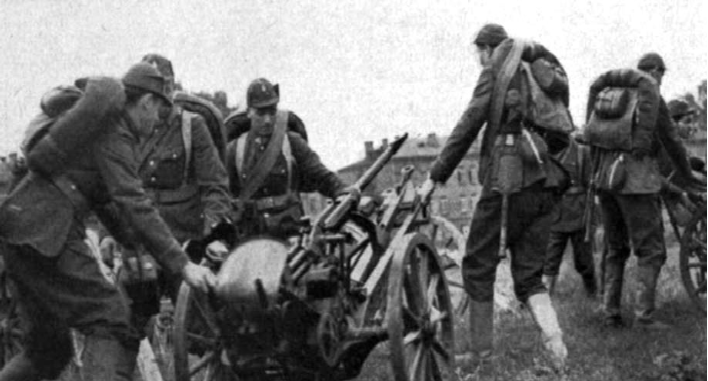
C.S. Vale (British military attaché in Kaunas) actually cautioned that any country would be making a grave mistake by thinking about Lithuanian Forces as only three weak and poorly armed infantry divisions.
--------------------------------
1939 German ultimatum to Lithuania was an oral ultimatum presented to Juozas Urbšys, Foreign Minister of Lithuania, by Joachim von Ribbentrop, Foreign Minister of Nazi Germany, on March 20, 1939. The Germans demanded that Lithuania give up the Klaipėda Region (also known as the Memel Territory), which had been detached from Germany after World War I, or the Wehrmacht would invade Lithuania.
After years of rising tension between Lithuania and Germany, increasing pro-Nazi propaganda in the region, and continued German expansion, the demand was expected. The ultimatum was issued just five days after the Nazi occupation of Czechoslovakia. The four signatories of the 1924 Klaipėda Convention, which had guaranteed the protection of the status quo in the region, did not offer any material assistance.
The United Kingdom and France followed a policy of appeasement, while Italy and Japan openly supported Germany. Lithuania was forced to accept the ultimatum on March 22. For Germany it was the last territorial acquisition before World War II; for Lithuania it was a major downturn in economy and morale; for Europe it was further escalation in pre-war tensions.
Klaipėda (German: Memel), an important seaport in East Prussia, was detached from Germany by Article 28 of the Treaty of Versailles and was governed by the Allies according to Article 99. France assumed administration of the region while Lithuania continued to lobby for its control, claiming that it should belong to Lithuania as it had a significant Lithuanian population (see Lithuania Minor) and was that country's only access to the Baltic Sea.
Poland also laid claim to the territory. As the Allies were hesitant to make a decision and it seemed that the region would remain a free state much like the Free City of Danzig, Lithuania took the initiative and organized the Klaipėda Revolt in January 1923. Soviet Russia and Germany supported the action.
The region, as an autonomous territory with its own parliament (Klaipėda Parliament), was attached to Lithuania. The region covered about 2,400 km² and had a population of approximately 140,000.
During the 1920s, Lithuania and Germany maintained a relatively normal relationship as they were united by anti-Polish sentiment.
In January 1928, after long and difficult negotiations, Germany and Lithuania signed a border treaty, which left Klaipėda on the Lithuanian side.
However, tensions began rising in the 1930s after the Weimar Republic was replaced with Nazi Germany. An especially tense period came in February 1934 when the Lithuanian government arrested dozens of pro-Nazi activists. In response to these arrests and trials, Germany declared a boycott of Lithuanian agricultural imports.
The boycott caused an economic crisis in Suvalkija (southern Lithuania), where farmers organized violent protests. However, after the plebiscite in Saar most of the pro-Nazi prisoners received amnesty.
In the wake of the amnesties, Lithuanian prestige suffered both abroad and in Klaipėda, allowing Germany to strengthen its influence in the region.In the spring of 1938 Adolf Hitler personally stated that gaining Klaipėda was one of his highest priorities, second only to gaining the Sudetenland.
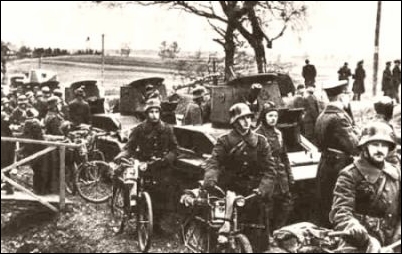
Lithuanian invasion of Poland 1939
When Poland presented its ultimatum to Lithuania in March 1938, Germany openly declared that in the event of a military clash between Poland and Lithuania, its army would invade Lithuania to capture Klaipėda and a large portion of western Lithuania.

A week after Lithuania accepted the Polish ultimatum, Germany presented an eleven-point memorandum that demanded freedom of action for pro-German activists in the region and a lessening of Lithuanian influence there. Its points were worded in a deliberately vague manner, which would enable Germany to accuse Lithuania of violations. Lithuania chose to postpone dealing with the problem, hoping that the international situation would improve. In the meantime it hoped to give the German population no reasons for complaint.
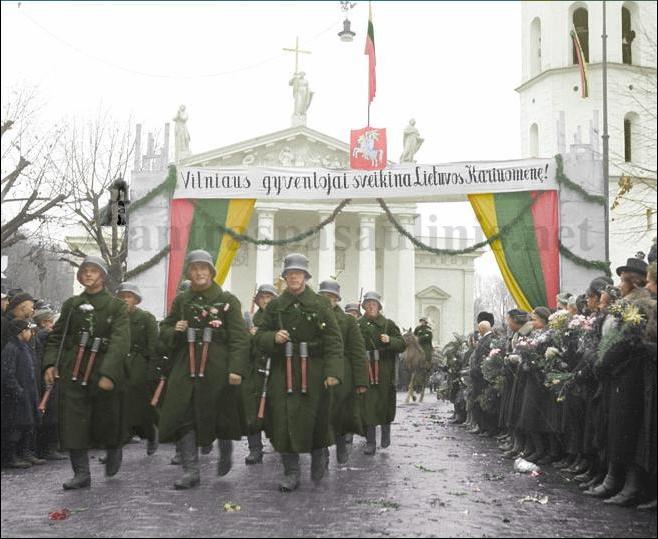
Lithuanian invasion of Poland 1939
This tactic did not prove successful: pro-Nazi propaganda and protests were rampant, even among the Lithuanian population, and the local government was powerless to prevent them. The Nazis physically harassed Lithuanian organizations. On November 1, 1938 Lithuania was pressured into lifting martial law and press censorship. During the December elections to the Klaipėda Parliament, pro-German parties received 87% of votes (25 seats out of 29) in the Klaipėda territory.
Dr. Ernst Neumann, the chief defendant in the 1934 trials, was released from prison in February 1938 and became the leader of Klaipėda's pro-German movement. In December he was received by Adolf Hitler, who assured him that the Klaipėda issue would be resolved by March or April 1939. Neumann and other Nazi activists claimed the right of self-determination for the region and demanded that Lithuania open negotiations over the political status of Klaipėda.
Lithuanian army parading in Vilnius
The parliament was expected to vote for a return to Germany when it convened on March 25, 1939. Germany's official channels maintained silence on the issue. Germany hoped that Lithuania would voluntarily give up the troubled region, and a public stance could have disturbed the sensitive discussions it was then engaged in with Poland over an anti-Communist alliance against the Soviet Union.
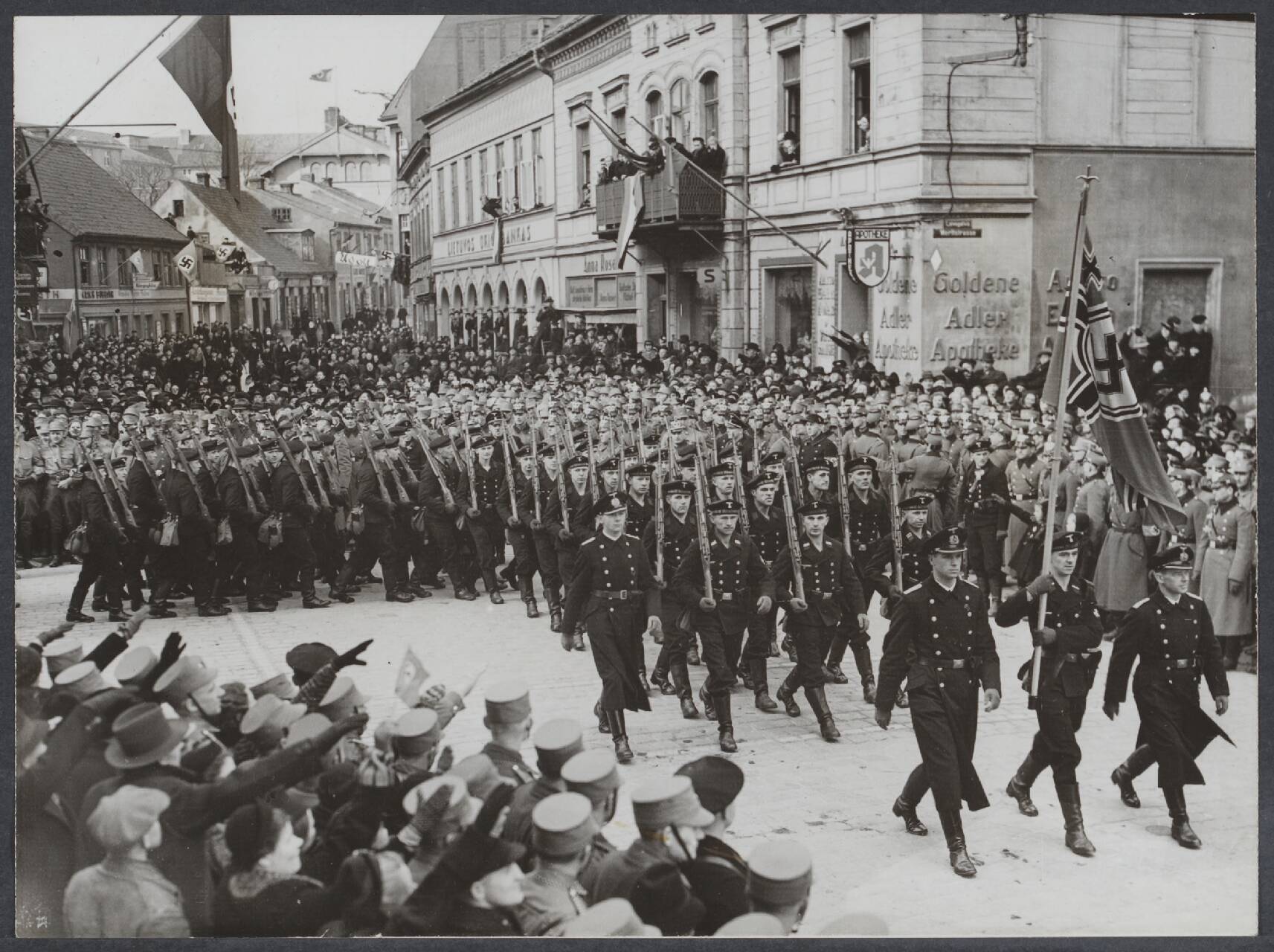
Hitler making a speech in Memel the day after the ultimatum was accepted
Rumors had reached the Lithuanian government to the effect that Germany had specific plans to take over Klaipėda. On March 12, Foreign Minister Urbšys represented Lithuania at the coronation of Pope Pius XII in Rome. On his return to Lithuania he stopped in Berlin with the hope of clarifying the growing rumors.
On March 20, Ribbentrop agreed to meet with Urbšys, but not with Kazys Škirpa, who was asked to wait in another room. The conversation lasted for about 40 minutes. Ribbentrop demanded the return of Klaipėda to Germany and threatened military action. Urbšys relayed the verbal ultimatum to the Lithuanian government. Because the ultimatum was never set down in writing and did not include a formal deadline, some historians have downplayed its import, describing it as a "set of demands" rather than as an ultimatum.
However, it was made clear that force would be used should Lithuania resist, and it was warned not to seek help from other nations. While a clear deadline was not given, Lithuania was told to make a speedy decision and that any clashes or German casualties would inevitably provoke a response from the German military.
Lithuania secretly informed the signatories of the Klaipėda Convention about these demands, since technically Lithuania could not transfer Klaipėda without the approval of the signatories. Italy and Japan supported Germany in the matter, while the United Kingdom and France expressed sympathy for Lithuania but chose not to offer any material assistance.
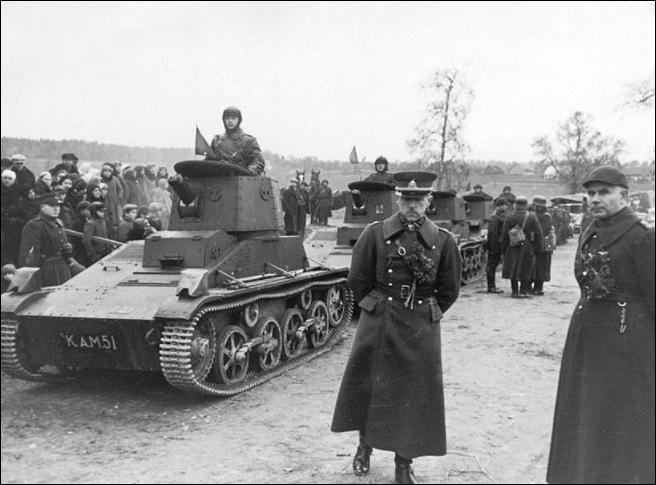
Lithuanian invasion of Poland 1939
They followed a well-publicized policy of appeasing Hitler. The UK treated the issue in the same way as it had treated the Sudeten Crisis and made no plans to assist Lithuania or the other Baltic States if they were attacked by Germany.
The Soviet Union, while supporting Lithuania in principle, did not wish to disrupt its relations with Germany at that point, since it was contemplating an alliance with the Nazis. Without any material international support Lithuania had no choice but to accept the ultimatum. Lithuanian diplomacy characterized the concession as a "necessary evil" that would enable Lithuania to preserve its independence and maintained the hope that it was merely a temporary retreat.






Ei kommentteja:
Lähetä kommentti
Any explosive ammunition or empty cores, you can put in this.